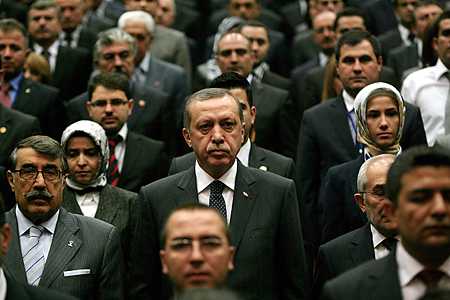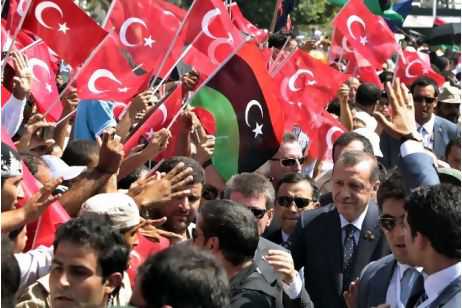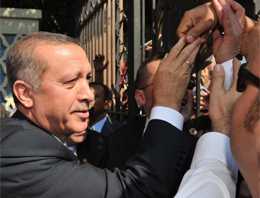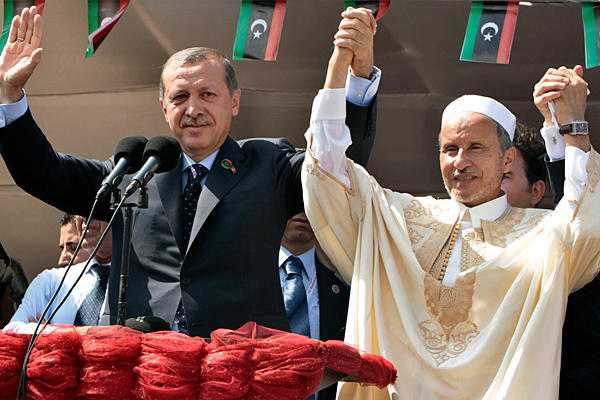By Ivan Watson, CNN
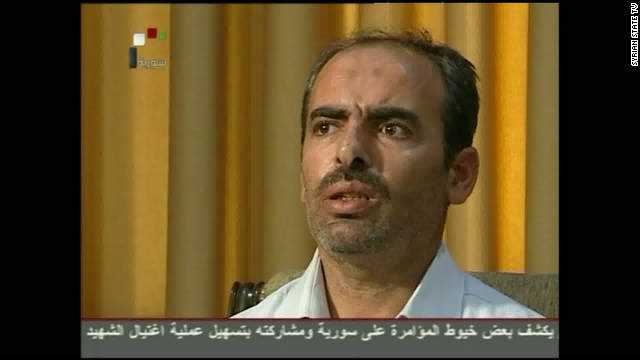
Istanbul (CNN) — Three months after he first appeared in an Internet video — in uniform, denouncing his government and calling on fellow soldiers to rebel — Lt. Col. Hussein al-Harmoush was back on television Thursday night, this time in a televised confession on Syrian state TV.
“I faced three edges of a sword,” he said, when asked why he returned from exile in Turkey to Syrian state custody. “I was a government defector and fugitive, second I left my society and family, and third, I fell out with those who coordinated with me.”
The drama gripped the country as violence played out in the streets. At least 46 people were killed across Syria on Friday in the ongoing confrontations between security forces and protesters, said the Local Coordination Committees of Syria, an opposition activist group that organizes and documents anti-government demonstrations. It said 45 of them were civilians and one was from the nation’s security forces. Twenty of the dead were in Idlib, 10 in Hama, five in Homs, five in Damascus and its surrounding area, and the rest were in Daraa and Deir Ezzor, LCC said.
Accounts of clashes inside Syria are difficult to independently confirm. The Syrian government has prevented international journalists from reporting without restraint inside the country.
The group said the body of al-Harmoush’s brother, Hassan, was found Friday; activists in Idlib posted on YouTube a video purportedly of the bloodied corpse.
Al-Harmoush also contradicted previous statements he had made as a rebel military leader, saying that “during my service in the Syrian army, nobody ordered me to fire at civilians. … I didn’t see or hear any commander in the army who gave orders to shoot at civilians.”
Al-Harmoush disappeared from a refugee camp where he had been living in Turkey on August 29. His sudden reappearance in Syrian government custody triggered a flurry of conflicting statements from Syrian opposition groups as well as from the Turkish government.
Several other men who said they had deserted from the Syrian armed forces released video statements demanding al-Harmoush’s release.
“Release him immediately and hand him to the Turkish government or we will respond harshly … by executing quick operations conducted by our brigades targeting all leadership of the military and security apparatus,” said a man who identified himself as Col. Riyad al-Asa’ad of the ‘Free Syrian Army.’
Some Syrian activists accused Turkey of handing al-Harmoush to Syrian security forces. Prominent Syrian exile activist Omar al-Muqdad first sounded the alarm about al-Harmoush’s disappearance on August 29.
“I talked to him on the morning of August 29th,” al-Muqdad said. “He said, ‘I have a meeting with a Turkish security man. When I finish I will call you.’ I waited for three days and didn’t hear from him. Then after that we discovered that the security man took him and didn’t send him back to the camp. They sent him to Syria directly. The Turks made a trick with Harmoush. They caught him in Turkey and sent him to Syria.”
The accusations prompted the Turkish foreign ministry to take the unusual step of publishing a statement denying the allegations.
“It is out of question that Syrian citizens are returned to Syria or any other country against their will,” the foreign ministry wrote, using an alternate spelling of al-Harmoush’s name. “It should be particularly emphasized that recent allegations concerning a Syrian citizen named Huseyin Harmush are totally unfounded.”
Omar Idlibi Said, a Beirut-based LCC representative, told CNN he believes al-Harmoush had been tortured and forced to make the televised statement. He also said al-Harmoush’s claims on Syrian state TV that Turkish smugglers are funneling weapons and ammunition across the border to Syrian rebels exonerated Turkey of any responsibility for the dissident officer’s capture.
“If the Turks handed him over, he would not say such a thing about Turkey. The Syrians would not let him mention that,” Said contended.
There is substantial evidence to suggest the Syrian regime carried out reprisal attacks against al-Harmoush’s family. Last week, Syrian security forces raided the village of Ibleen, killing al-Harmoush’s brother Mohammed as well as several other army deserters.
At least 2,978 people have been killed in Syria since mid-March, when demonstrations critical of the government were met with a fierce security crackdown, according to LCC.
Neighboring Turkey has become an “underground railroad” of sorts for Syrian opposition members.
Turkey has also hosted a number of Syrian opposition meetings. On Thursday, a group calling itself the Syrian National Council announced its formation at a conference in Istanbul.
Turkey’s prime minister, once one of the closest regional allies of Syrian President Bashar al-Assad, had sharp words for the Damascus regime on Friday.
“Those who inflict repression on their own people in Syria won’t be able to survive,” Recep Tayyip Erdogan told journalists during a visit to the Libyan capital. “The period of autocracy is over. Totalitarian regimes are going. People’s governments are coming now.”
As occurred in a number of other countries, Erdogan’s government went from being a close trading partner of Libyan strong-man Moammar Gadhafi to becoming a staunch supporter of the rebel National Transitional Council.
Meanwhile, the Syrian government issued a statement protesting a recent meeting between the general secretary of the League of Arab States and representatives of the Syrian opposition.
Mohamed Mamoun Al Humsi, a former Syrian parliament member living in Cairo, said he and a number of other opposition members presented a list of demands during a meeting Wednesday with the Arab League’s secretary-general, Nabil Al Araby.
Among the opposition’s requests were the suspension of Syria’s membership in the Arab League, the establishment of a “no-fly zone” over Syria to prevent shipments of weapons to the regime, and an end to alleged intervention by Hezbollah and Iran in Syrian domestic affairs.
According to Syria’s state news agency, Syria’s representative to the Arab League accused Al Araby of exceeding his mandate, calling the meeting with the Syrian opposition an “irresponsible act.”
CNN’s Hamdi Alkhshali, Mohamed Fadel Fahmy and Yesim Comert

